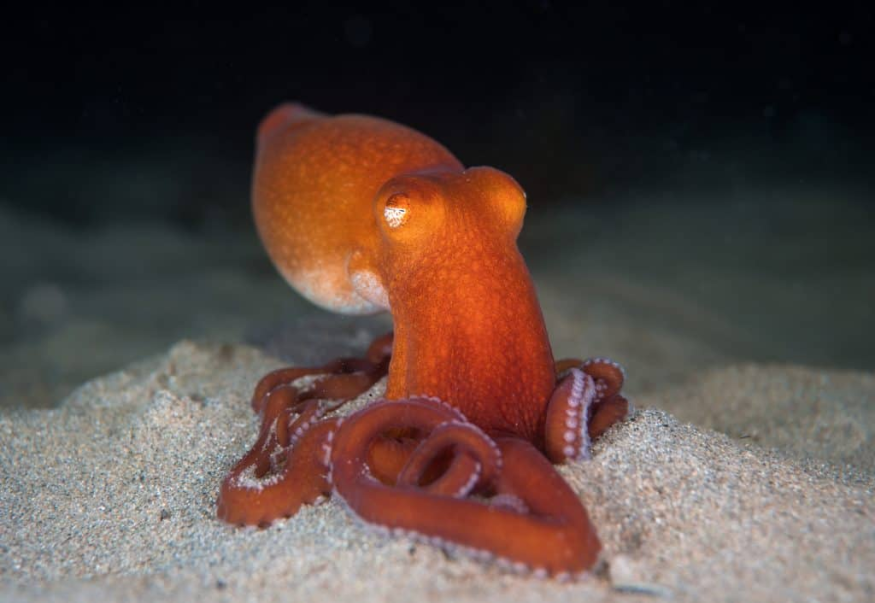Researchers believe that the venom of an Australian octopus can reduce cancer development and assist drug-resistant individuals battle one of the most deadly kinds of melanoma.
A multinational investigation discovered preliminary evidence that a chemical in the sting of an Australian southern sand octopus might serve as a basis for highly focused, less harmful therapy of BRAF-mutated melanoma. The BRAF gene is mutated in around half of all melanomas.
Maria Ikonomopoulou, who started investigating the venom molecule at QIMR Berghofer Medical Research Institute in Brisbane, led the pre-clinical study published in the British Journal of Pharmacology. Scientists tested how effectively various synthetic venom chemicals discovered by University of Queensland researchers may fight tumors.
The southern sand octopus is relatively small to medium-sized octopus with only a mantle length of up to 85 mm (3.5 in) and an overall length of around 420 mm (16.5 in). It has a broad head (albeit somewhat shorter than the mantle) and squinty eyes, which do not extend much beyond the surface of the skull. It has exceptionally long arms (3-6x the length of the mantle in adult animals), tiny suckers, and a deep web. It has a long and narrow funnel. This is a benthic, subsurface species that thrive in coastal waters up to 50 meters deep (164 ft), following a report from OctoNation.
The Toxic as a Cure
Dr. Ikonomopoulou, a senior researcher at the Madrid Institute for Advanced Studies in Food, stated that researchers analyzed several specimens of venom from diverse aquatic ecosystems. She stated that an octopus-derived peptide appeared more efficient against BRAF-mutated melanoma cells, as per Sydney Morning Herald.
She mentioned that the study was extremely surprising and delightfully fascinating was how, when they examined it in healthy cells, it appeared to have no impact, and even at very high doses, it was safe in healthy cells. The study was carried out at the Madrid Institute for Advanced Studies in Food in Spain.
Melanoma Skin Malignancy, as defined by the American Cancer Society, is a less commonly diagnosed cancer that can develop and spread. It happens when melanocytes proliferate out of pace or in an unanticipated way. If melanoma is not treated promptly, the patient may be at risk.

ALSO READ: Blue-Ring Octopus: World's Most Venomous Octopus Unknowingly Held Barehanded in Viral Tiktok Video
Octopus Polypeptide
Dr. Ikonomopoulou advised Newsweek that the octopus polypeptide aids in preventing BRAF-mutated melanoma, stressing that it has been demonstrated to be safe and non-toxic even at large levels.
According to the findings, the study claims that better outcomes might be obtained by combining the usage of additional FDA-approved melanoma drugs; they will subsequently perform a preclinical and clinical evaluation in the lab as a therapeutic contender for melanoma cancer therapy. The octopus peptide is thought to address the BRAF-melanoma mutation; therefore, the researchers will check into the same finding in other BRAF-mutated malignancies, such as colon and prostate.
In contrast, the study lead indicated that individuals with Melanoma experienced focused strategies for skin cancer treatment that included immunotherapy. The strategy produced excellent results, but the obstacles stemmed from the approach's negative effects, poor response frequency, and drug resistance.
Melanoma, the most deadly kind of skin cancer, can expand and grow from or within a lesion that looks like a black spot, following the American Academy of Dermatology Association (AAD) report, and becomes lethal as it progresses swiftly.
RELATED ARTICLE: Rare Sighting of Blanket Octopus With Rainbow Hues Captured in the Great Barrier Reef
Check out more news and information on Octopus in Science Times.
© 2026 ScienceTimes.com All rights reserved. Do not reproduce without permission. The window to the world of Science Times.












